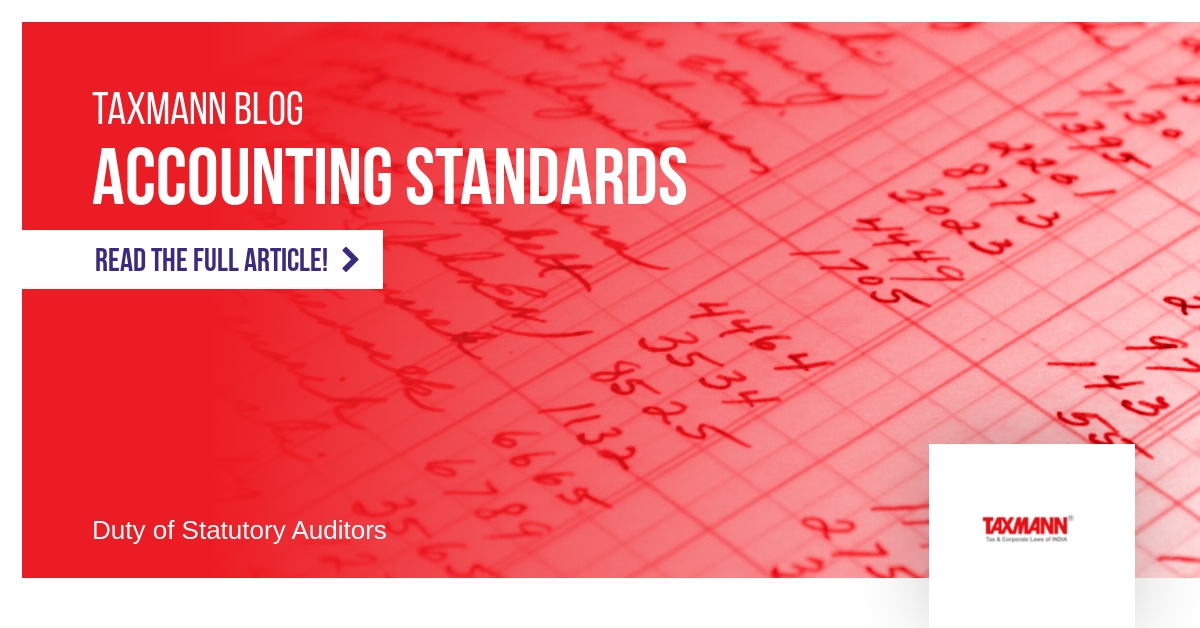Accounting Standards: Duty of Statutory Auditors
- Blog|Account & Audit|
- 2 Min Read
- By Taxmann
- |
- Last Updated on 18 September, 2023
Table of Content
- Duty of Statutory Auditor for Compliances with AS
- Mandatoriness of AS to Auditor and to Management
- Recognition of Law to AS
- Composition of Accounting Standards
- Type of organizations to whom AS is applicable

1. Duty of Statutory Auditor for Compliances with AS
While discharging their attest functions, it will be the duty of the members of the Institute to ensure that the Accounting Standards are implemented in the presentation of financial statements covered by their audit reports.
In the event of any deviation from the Standards, it will also be their duty to make adequate disclosures in their reports so that the users of such statements may be aware of such deviations.
2. Mandatoriness of AS to Auditor and to Management
When the institute declares an AS as mandatory w.e.f. from a particular date then it applies to all the accounting periods commencing on or after that date.
These AS are in true sense mandatory to the members of ICAI who are acting as Statutory Auditors and not to the management of that organisation.
ICAI as such cannot make these standards mandatory to the management unless the law governing them requires to follow it.
However, choice of accounting policies as suggested in the Accounting Standards are always preferred as these contains the judicious opinion of the professional accountancy body of the country & also it is mandatory for the statutory auditors to report deviations from the accounting policies suggested in the mandatory Accounting Standard.
3. Recognition of Law to AS
As per section 211(3C) of the Companies Act, 1956 Central Govt. has formulated the Companies (Accounting Standards) Rules, 2006. It has notified AS-1 to AS-29 applicable to accounting period commencing on or after 7.12.2006.
The Income-tax Act vide section 145 specifies that assessees should comply with such accounting standards as may be notified by the Government. So far only two accounting standards NAS-1 & NAS-2 which are broadly based on AS-1 & AS-5 have been notified to be followed by assessee’s following mercantile system of accounting.
4. Composition of Accounting Standards
The accounting standard generally comprises of introduction and the background of the areas in which standard is issued.
It also contains meaning and definition of various terms used in the standard and the various accounting practices related to the subject-matter of standard which are presently being followed by different organizations & its pros & cons.
Then finally it contains the Accounting Standards detailing the policies to be followed and this standards are to be read in the context of above background and preface.
Thus standard has explanatory clauses and clauses containing standard. But all the clauses have equal importance.
Dive Deeper:
An Overview of Bank Statutory Audit
5. Type of organizations to whom AS is applicable
AS is applicable to:
-
- Sole Proprietary Concerns/Individuals.
- Partnership Firms
- Societies
- Trusts
- Hindu Undivided Families
- Association of Persons
- Co-operative Societies
- Companies
It is not applicable to purely charitable organization, if it does not have any commercial, industrial and business activity.
Disclaimer: The content/information published on the website is only for general information of the user and shall not be construed as legal advice. While the Taxmann has exercised reasonable efforts to ensure the veracity of information/content published, Taxmann shall be under no liability in any manner whatsoever for incorrect information, if any.

Taxmann Publications has a dedicated in-house Research & Editorial Team. This team consists of a team of Chartered Accountants, Company Secretaries, and Lawyers. This team works under the guidance and supervision of editor-in-chief Mr Rakesh Bhargava.
The Research and Editorial Team is responsible for developing reliable and accurate content for the readers. The team follows the six-sigma approach to achieve the benchmark of zero error in its publications and research platforms. The team ensures that the following publication guidelines are thoroughly followed while developing the content:
- The statutory material is obtained only from the authorized and reliable sources
- All the latest developments in the judicial and legislative fields are covered
- Prepare the analytical write-ups on current, controversial, and important issues to help the readers to understand the concept and its implications
- Every content published by Taxmann is complete, accurate and lucid
- All evidence-based statements are supported with proper reference to Section, Circular No., Notification No. or citations
- The golden rules of grammar, style and consistency are thoroughly followed
- Font and size that’s easy to read and remain consistent across all imprint and digital publications are applied



 CA | CS | CMA
CA | CS | CMA
